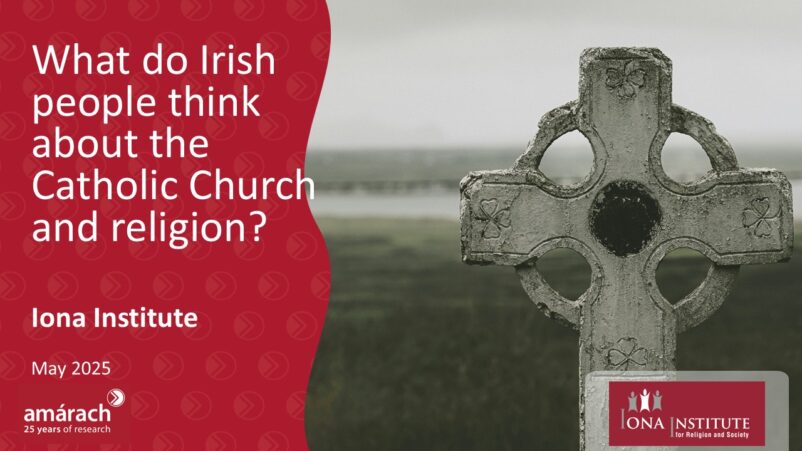A major new poll commissioned by The Iona Institute reveals the public are split in their attitudes towards the Catholic Church. The poll was conducted by Amarach Research.
Among the findings of the poll is that the public are very evenly divided in their attitudes towards priests and nuns with almost exactly a third in each case viewing them positively, a third negatively, with the rest neutral.
The polls also show that the public have differing attitudes towards Christianity on the one hand and the Catholic Church on the other.
Half of respondents to the poll said they have a positive view of Christianity with a fifth of people saying they have a negative view, with the rest in between.
But only 27pc of people have a favourable view of the Catholic Church overall, with 40pc saying they have an unfavourable view.
This may reflect a more negative attitude towards the Catholic Church as an institution rather than Catholicism per se because 45pc agree that Catholic teachings are still of benefit to society with 32pc disagreeing.
Notably, the poll finds that 18-24 year-olds (‘Gen-Z’) are somewhat more favourable towards religion and spirituality than those aged 25-35 (‘Millennials’).
Seventeen percent of 18-24 year-olds say they are religious compared with just 5pc of 25-34 year-olds, while 54pc say they are religious and/or spiritual compared with 46pc of 25-34 year-olds.
This counters the general view that religion is in continuous decline among younger people.
In addition, 18-24 year-olds are more likely to read spiritual or religious books, watch spiritual or religious content and follow individuals on social media who discuss spirituality and religion than 25-34 year-olds.
The poll finds that one in four people say they would be happy if the Catholic Church vanished from Irish society completely, with 51pc disagreeing and the rest neutral.
The poll also reveals that the public are overestimating the number of priests guilty of child abuse by around four to one.
Unsurprisingly, the poll shows significant differences by age with younger people being more likely to hold a negative view and older people a more positive one.
Also unsurprisingly, regular Mass-goers have by far the most positive view of the Church, while those who do not consider themselves Catholic at all having the most negative one. ‘Cultural Catholics’ that is those who say they are Catholic but rarely attend Mass are somewhere in between.
The poll finds that 22pc of respondents do not describe themselves as Catholic, which is roughly in line with Census 2022. About 16pc of respondents say there are regular Mass-goers.
Among the other findings of the poll is that 61pc of respondents say they are ‘spiritual’ or ‘religious’ or both, with 31pc saying they are neither and 9pc undecided.
Some of the poll questions are identical to those asked in 2011 in another poll commissioned by The Iona Institute, and comparisons are included in the results which are available here.
Commenting on the results, Breda O’Brien, a spokesperson for The Iona Institute said: “In a way it is not surprising that public attitudes towards the Catholic Church are so divided and that there is considerable negativity, especially in view of all the scandals which are still fresh in the public mind.
“It’s good to see that many people are less negative about the teachings of the Catholic Church than they are towards the institution.”
She added: “It’s interesting that older people, who are most familiar with priests and nuns are the least negative in their attitudes. Many young people never meet priests or nuns and their whole image is shaped by the scandals or by negative portrayals in the movies or in documentaries.
“But the vast majority of priests and nuns do good work in their parishes or in the wider community, and hopefully over time those who view priests and religious negatively will come to a more rounded view, and this will eventually be reflected in dramas and documentaries as well”.
She concluded: “We hear a lot from those who are most negative. Maybe it’s time that those who are more positive find their voice and are given space to express themselves as well.”
















